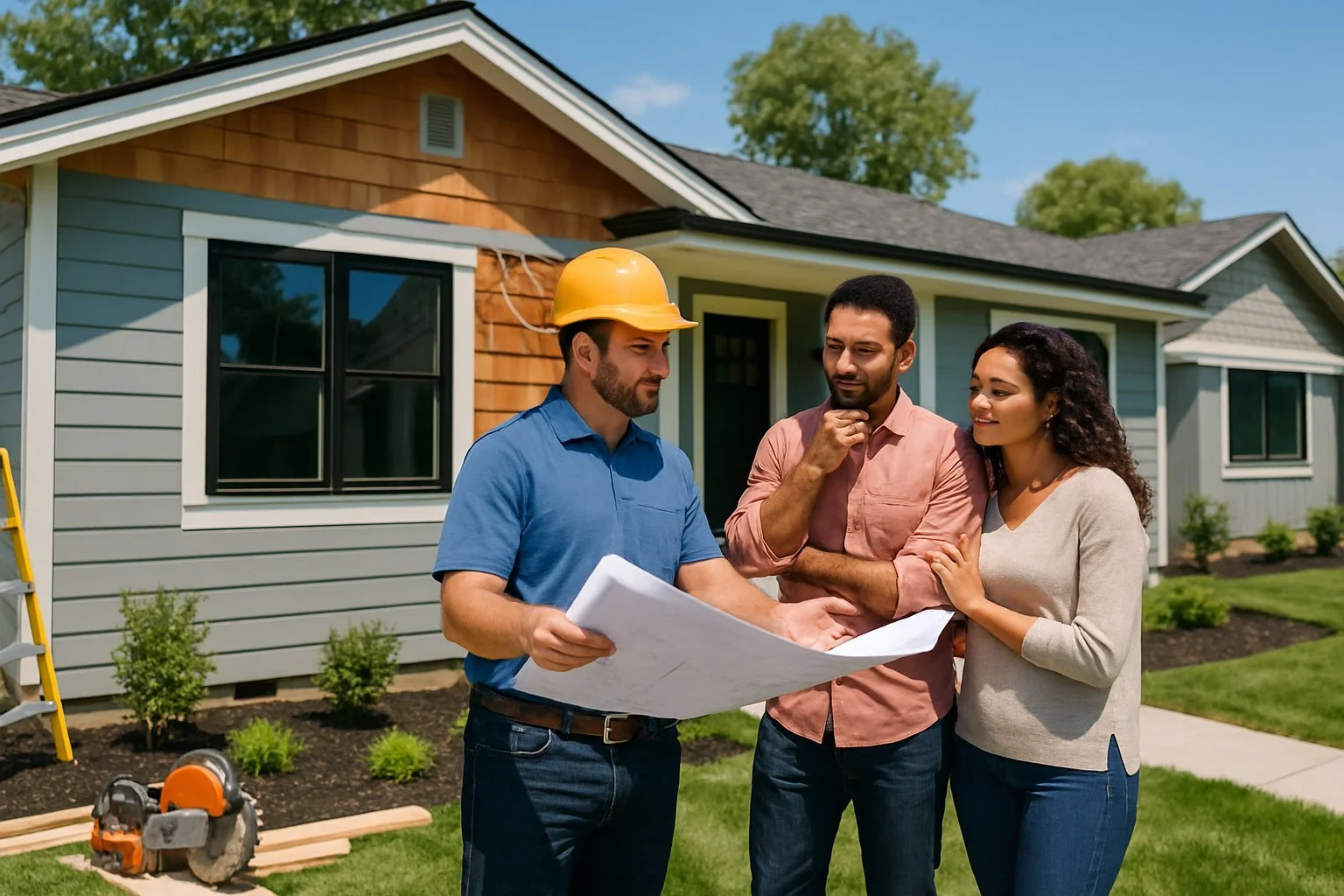Things You Need to Know Before Remodeling a Home in Texas
Remodeling your home in Texas involves specific rules and requirements that differ from other states. Texas law requires permits for most major home renovations, and failing to get proper permits can result in fines and problems when selling your home.
We understand that starting a remodeling project can feel overwhelming. Texas has unique building codes, weather considerations, and permit processes that homeowners must follow. The hot climate and severe weather patterns also affect material choices and construction methods.
Before we begin any remodeling work, we need to research local regulations and hire qualified professionals. Texas municipalities have different rules, so what applies in Houston may not work in Austin or Dallas. Getting the right information upfront saves time, money, and stress later.
Key Takeaways
Texas requires permits for most major home renovations and has strict building codes
Weather conditions and local regulations vary significantly between Texas cities
Professional guidance and proper planning prevent costly mistakes and legal issues
Essential Requirements Before Remodeling a Home in Texas
Texas home remodeling projects require proper permits, licensed contractors, and detailed budget planning. We must understand state regulations and local building codes before starting any renovation work.
Legal Regulations and Permits
Texas requires permits for most structural changes, electrical work, and plumbing modifications. We need to contact our local building department before starting any home remodel project.
Building permits protect us from code violations and potential safety issues. Each city has different requirements, so we must check with our specific municipality.
Common projects requiring permits:
Kitchen renovations with electrical or plumbing changes
Bathroom additions or modifications
Room additions
Structural wall removal
HVAC system installations
We should apply for permits 2-4 weeks before starting work. The approval process varies by city size and project complexity.
Some cities require licensed professionals to pull permits. We cannot use unlicensed contractors for permitted work in Texas.
Selecting a Qualified Contractor
Texas law requires contractors to be licensed for projects over $50,000. We must verify our contractor's license through the Texas Department of Licensing and Regulation.
Key verification steps:
Check contractor license status online
Verify current insurance coverage
Request recent project references
Confirm local business registration
We should get written estimates from at least three contractors. Each estimate must include materials, labor costs, and project timeline.
Licensed contractors understand Texas building codes and permit requirements. They handle inspections and ensure home remodeling work meets state standards.
We must never hire contractors who ask for full payment upfront. Texas contractors can only request 10% down or $1,000, whichever is less.
Budget Planning and Cost Estimates
Remodeling costs in Texas vary significantly by region and project scope. We should budget 15-20% above our initial estimates for unexpected expenses.
Average Texas remodeling costs:
Kitchen renovation: $25,000-$75,000
Bathroom remodel: $15,000-$35,000
Room addition: $80-$200 per square foot
We need separate budgets for permits, materials, labor, and contingencies. Permit fees typically cost $500-$2,000 depending on project size.
Material costs fluctuate based on availability and local suppliers. We should get current pricing before finalizing our budget.
Our financing options include home equity loans, personal loans, or cash payments. We must secure funding before signing contractor agreements.
Key Considerations and Professional Guidance
Planning your remodeling project requires careful attention to timing, budget, and design decisions. Working with qualified professionals helps ensure your renovation meets your goals and stays within your timeline and budget.
Timing and Project Scope
Peak season runs from March through October in Texas. Contractors charge higher rates during these months due to increased demand.
Winter months offer better pricing and faster scheduling. We recommend booking contractors between November and February for the best deals.
Project duration varies by scope:
Kitchen remodels: 6-12 weeks
Bathroom updates: 4-8 weeks
Whole-house renovations: 4-8 months
Budget planning should include a 20% contingency fund. Texas weather can cause unexpected delays that increase costs.
Permit processing takes 2-4 weeks in most Texas cities. Submit applications early to avoid project delays.
Role of Interior Designers
Licensed interior designers handle space planning, material selection, and code compliance. They coordinate with contractors to ensure proper installation.
Design-build firms offer both interior design and construction services. This approach streamlines communication and project management.
Hourly rates range from $75-150 in Texas markets. Some designers charge flat fees for specific services like material selection.
Value they provide includes:
Access to trade-only suppliers
Knowledge of building codes
Project timeline management
Problem-solving during construction
When to hire an interior designer depends on project complexity. Multi-room renovations benefit most from professional guidance.
Design Preferences and Aesthetic Continuity
Style consistency throughout your home increases resale value. Choose design elements that complement existing architecture.
Texas regional styles include Hill Country rustic, modern farmhouse, and contemporary ranch. These styles work well with local climate and building materials.
Color schemes should account for intense Texas sunlight. Light colors help rooms feel cooler and reduce energy costs.
Material choices must withstand high humidity and temperature changes. Engineered wood and tile perform better than solid hardwood in many Texas regions.
Future flexibility matters for growing families. Choose neutral base colors and add personality through accessories and furniture.
Frequently Asked Questions
Texas homeowners need specific permits for most remodeling work, and costs can vary widely based on project scope. Building codes change regularly, and choosing the right contractor requires careful research.
What permits and approvals are required for home remodeling in Texas?
Most Texas cities require permits for electrical, plumbing, and structural work. We need permits for projects that change the home's footprint or add square footage.
Kitchen and bathroom remodels typically need permits if we move plumbing or electrical systems. Adding rooms, decks, or garages always requires permits and inspections.
Some cities allow minor repairs without permits. Examples include painting, flooring replacement, and cabinet installation without plumbing changes.
We should check with our local building department before starting any project. Permit requirements vary between cities like Houston, Dallas, and Austin.
How should a homeowner budget for a home remodeling project in Texas?
We should plan to spend 10-20% more than our initial budget for unexpected costs. Texas labor costs range from $50-100 per hour depending on the trade and location.
Kitchen remodels in Texas typically cost $15,000-50,000 for mid-range projects. Bathroom renovations usually range from $8,000-25,000 depending on size and finishes.
We need to factor in permit costs, which range from $100-2,000 based on project scope. Material costs have increased 15-30% since 2020 in most Texas markets.
Getting three written estimates helps us understand realistic pricing. We should also set aside money for temporary housing if needed during major renovations.
What are the latest building codes and regulations in Texas that might affect a home remodeling project?
Texas adopted the 2018 International Residential Code with local amendments in most cities. New electrical work must include AFCI breakers in bedrooms and living areas.
Window requirements changed for energy efficiency in hot climates. We need windows with specific U-factors and Solar Heat Gain Coefficients in Texas.
Insulation requirements increased for walls and attics. Most areas now require R-13 wall insulation and R-38 attic insulation minimum.
Smoke detector rules require hardwired units with battery backup in new construction. We must update detectors when doing major electrical work.
What are the best practices for selecting a contractor for a home remodel in Texas?
We should verify the contractor holds proper Texas licenses through the state website. All contractors need general liability insurance and workers' compensation coverage.
Checking references from recent projects helps us understand work quality. We should visit completed jobs if possible to see the contractor's work firsthand.
Getting detailed written contracts protects both parties. The contract should include materials, timeline, payment schedule, and change order procedures.
We should avoid contractors who ask for large upfront payments. Texas law limits initial payments to 10% or $1,000, whichever is less.
How can a homeowner ensure the quality of materials and workmanship in a Texas home remodeling project?
We should specify exact materials and brands in our contract. This prevents contractors from substituting lower-quality alternatives without permission.
Regular inspections during construction help catch problems early. We should be present for key milestones like framing, plumbing rough-in, and electrical work.
Taking photos throughout the project documents progress and quality. This creates a record if disputes arise later about workmanship.
We should hold final payment until all work passes city inspections. Most contractors expect 10% retention until project completion and final approval.
What are the common challenges one might face during a home remodel in Texas and how to overcome them?
Texas weather can delay outdoor projects during summer heat and winter storms. We should plan flexible timelines and avoid scheduling exterior work during peak summer months.
Permit delays happen frequently in major Texas cities. Starting the permit process 4-6 weeks before construction helps avoid delays.
Material shortages affect many products including appliances and lumber. We should order materials early and have backup options selected.
Surprise structural issues often appear in older Texas homes. Foundation problems and outdated electrical systems require immediate attention and budget adjustments.




